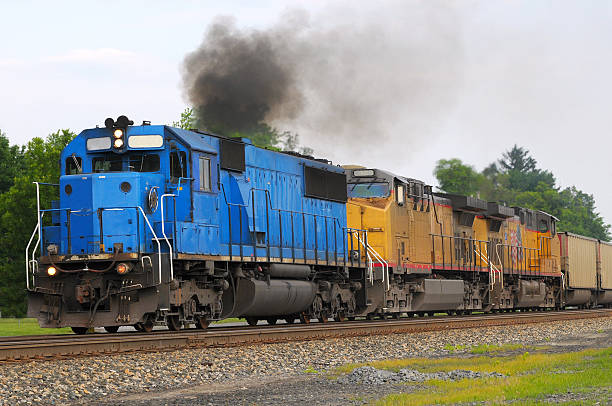Additionally, many non-smoking railroad employees were exposed to copious amounts of secondhand smoke, another recognized lung carcinogen. Unfortunately, because of decades of exposure to known carcinogens, these workers are tragically diagnosed with lung cancer at elevated rates.

Diesel Exhaust and Lung Cancer
Since the post-World War II dieselization of the railroad industry, it has been widely known that diesel exhaust contains carcinogens. Diesel exhaust contains arsenic, dioxin, benzene and chromium – chemicals and metals that are highly carcinogenic. So everyone (including the railroads) knew that diesel locomotive exhaust was full of potent carcinogens. Nevertheless, it took until 2012 for The World Health Organization (“WHO”) to declare diesel exhaust itself, a known carcinogen.
WHO declared that diesel exhaust exposures specifically cause lung cancer. For that reason, it is very difficult for railroads to deny that their employees’ lung cancer claims are unrelated to their workplace diesel exposures.
Railroad Mechanics & Lung Cancer
The diesel mechanics and carmen who repair and maintain diesel engines and rail cars often work in poorly ventilated shops and roundhouses where engines run in closed spaces. In addition to the diesel exhaust, these shops are often filled with dusts, fumes and vapors from solvent baths, welding and metal cutting operations. To make matters worse, asbestos insulated pipes, brakes and gaskets were often cut and reshaped in these shops, making the air quality all the more toxic.
Many of the most carcinogenic toxins found in diesel exhaust adhere to the soot which is comprised of very fine particles that are easily inhaled and deposited into the lungs. In addition to causing tissue damage, these substances initiate mutations in the lung cells, which in turn lead to the development of lung cancer.
Types of Lung Cancer
Diesel exhaust lung cancer can be divided into two types: small-cell lung cancer (SCLC) and non-small cell lung cancer (NSCLC). The appearance of the tumor cells determines what type of lung cancer is present. SCLC accounts for roughly 10-15 percent of lung cancers while NSCLC accounts for roughly 85 percent of lung cancers.
The most common lung cancers associated with diesel exhaust exposures are adenocarcinoma and squamous cell carcinoma.
The Importance of Lung Cancer Screenings
If you worked for a railroad and were exposed to diesel exhaust, it is vital that you inform your doctor about your exposure history. Doctors who are properly informed about risk factors for lung cancer – such as long term diesel, asbestos, secondhand smoke and silica exposures – may approve cancer screening procedures.
Screenings include chest x-rays or low-dose computed tomography (LDCT). LDCT tests are basically CT scans with low radiation exposures. Non-smokers with 40-year diesel exposures should ask their doctors for these lung cancer screenings. Early detection of lung cancer makes a significant difference in survival rates.
Signs & Symptoms of Lung Cancer
Lung cancer caught early is often treatable. Unfortunately, in its early stages, lung cancer typically does not show any symptoms. As the disease progresses, symptoms may appear, including chronic coughing, repeated respiratory infections, shortness of breath, wheezing, chest pain, hoarseness, fatigue, weakness, weight loss, severe headaches, fever, body pain or difficulty swallowing.
Many of the symptoms are a result of breathing passages that are blocked or due to cancer spreading to other parts of the body.
Contact Our Chicago Railroad Cancer Attorneys
If you believe your lung cancer is due to railroad exposure to toxins contained in diesel exhaust or asbestos, our dedicated team at Hughes Law Offices is here to fight on your behalf. At Hughes Law Offices, one of our railroad cancer attorneys will take all carcinogenic exposures into account when proving up your Federal Employers Liability Act (FELA) claim. We will work with experienced industrial hygienists to ensure that no exposures are overlooked, and our medical experts will help match relevant exposures to the illness at hand.
We believe hard working railroad workers who have been diagnosed with cancer due to carcinogen exposure at work are entitled to justice and fair compensation, and we are here to help you. Call our law firm today for more information or to schedule your free consultation.

